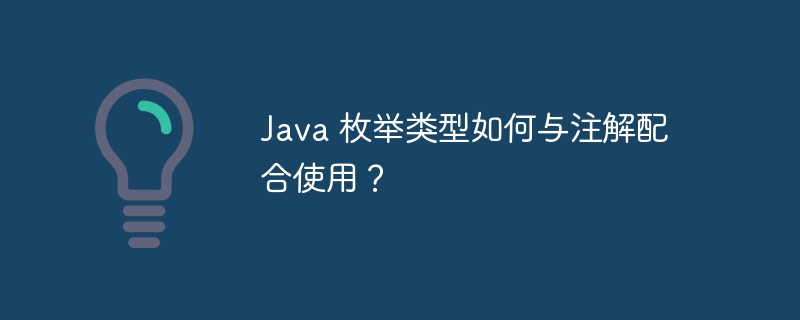
Yes, enumeration types and annotations can be used together to create powerful solutions by using annotations to specify additional information about the enumeration constants, such as names, hex codes, etc., and provide validation rules and configuration information . For example, using the @ValidColor annotation ensures that the color field of the Product class only contains a value of one of RED, GREEN, or BLUE.

The perfect combination of Java enumeration types and annotations
Enumeration types and annotations are the two most powerful elements in the Java programming language features, when used together they can create powerful and flexible solutions. In this article, we will explore how to use enumeration types with annotations and provide a practical example to demonstrate its advantages.
Enumeration type
An enumeration type is a special Java class that represents a set of known constants. Each constant in an enumeration type corresponds to a value and cannot be modified.
For example, the following code defines an enumeration type named Color, which contains three colors:
public enum Color {
RED,
GREEN,
BLUE
}Annotations
An annotation is a type of metadata that can be attached to a Java element (such as a class, method, or field) to provide additional information about the element. Annotations can be used for various purposes, such as:
Using enumeration types and annotations together
Enumeration types and annotations can be used together to create powerful solutions. For example, we can use annotations to specify additional information about specific enumeration constants, as shown in the following example:
public enum Color {
@MyAnnotation(name = "Red", hex = "#FF0000")
RED,
@MyAnnotation(name = "Green", hex = "#00FF00")
GREEN,
@MyAnnotation(name = "Blue", hex = "#0000FF")
BLUE
}
@interface MyAnnotation {
String name();
String hex();
}In this example, we use the @MyAnnotation annotation to specify each color enumeration Give the name and hexadecimal code of the constant.
Practical Case
Let us consider a practical case showing how to use enumeration types with annotations. Suppose we have a Product class that has a color field that can be one of RED, GREEN, or BLUE.
public class Product {
private Color color;
// ... 其他代码
} To ensure that the color field can only contain one value from RED, GREEN, or BLUE, we can Use the @ValidColor annotation to validate the field value as shown below:
public class Product {
@ValidColor
private Color color;
// ... 其他代码
}
@interface ValidColor {
// ... 验证逻辑
} Now when we try to assign an invalid value like PURPLE to color field, the @ValidColor annotation will throw an exception to prevent invalid values from being stored.
Conclusion
Enumeration types and annotations are very powerful and flexible in Java programming. When used together, they help us create robust, maintainable, and scalable applications.
The above is the detailed content of How do Java enum types work with annotations?. For more information, please follow other related articles on the PHP Chinese website!
